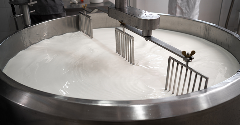News
FrieslandCampina emphasises member sustainability performance
18 Dec 2014Friesland Campina has announced that, with effect from 2015, member dairy farmers will be paid a premium based on their sustainability performance. The outdoor grazing premium will also be increased. The company said that its quality and sustainability programme, Foqus planet, is switching from a system based on performance categories and points for sustainability gains […]

Friesland Campina has announced that, with effect from 2015, member dairy farmers will be paid a premium based on their sustainability performance. The outdoor grazing premium will also be increased.
The company said that its quality and sustainability programme, Foqus planet, is switching from a system based on performance categories and points for sustainability gains to a system based on tighter basic requirements, including a grace period and a reward for strong sustainability performances. One consequence of these tighter basic requirements will be a ban on the use of compost and composted material from 1 January 2015. If member farmers do not (fully) satisfy these basic requirements, they will be given a four-week grace period in which to rectify the situation. Failure to do so will result in the rejection of their milk. Unannounced spot checks will also be carried out. Use of the Recycling Indicator (KringloopWijzer) will be mandatory for dairy farms with a phosphate surplus.
FrieslandCampina said that it intends to use its Foqus planet strategy to help it meet the relevant sector targets by 2020. In 2015 it will therefore start applying six indicators for animal health and welfare, biodiversity and environment and climate and energy, the results for which are measureable. This will ensure that results rather than measures are rewarded. Points will be given for the results posted under each indicator, and together these will yield an aggregate score. The level of premium paid will depend on the overall volume of milk supplied and the total number of points gained. The premium will be financed through a pro forma deduction of 0.25 euros per 100 kg of milk supplied.
FrieslandCampina will extend its existing outdoor grazing policy in 2015, and the contribution for pasture grazing will be increased to €1 per 100 kg of milk. This increase, which will be charged on top of the contribution of €0.50 per 100 kg of milk from the business, will be funded by a cooperative scheme. The deduction charged will be €0.35 per 100 kg of milk. This means that dairy farms with no outdoor grazing policy will be asked to contribute to its preservation. The contribution for partial outdoor grazing will be increased to €0.46 per 100 kg of milk.
Related news

Consumers dislike faba beans’ sensory profile
3 Jun 2024
Consumers display low acceptance of faba beans, with sensory properties such as bitterness a core concern, a study suggests. However, for product varieties such as cocoa-free chocolate, this attribute could prove to be a benefit.
Read more
Food scientists uncover new way to preserve nutrient and flavour quality
29 May 2024
Researchers have developed a method that guarantees food safety for low-moisture products, such as dried milk, while maximising quality by retaining vitamins, minerals, and flavours, they say.
Read more
FDA scrutinizes milk pasteurisation over HPAI risk
28 May 2024
The US Food and Drug Administration (FDA) is undertaking additional scientific research work to ensure that approved pasteurization processes are rigorous enough after retailer milk tests showed contamination from Highly Pathogenic Avian Influenza (HPA...
Read more
Magnum targets ice cream lovers’ moods with new flavours
2 May 2024
Unilever-owned Magnum has released a suite of “mood-inspired flavours” as the 2024 ice cream season kicks off. The offerings, marketed as the Magnum Pleasure Express, are Magnum's first foray into the “mood-food” category.
Read more
The eight global food trends shaping the future of dining
23 Apr 2024
Unilever’s Future Menu Trend 2024 report identifies the global food trends shaping the food service industry, providing insights into changing consumer preferences that could provide inspiration for packaged food and drink brands.
Read more
Report outlines how the US interfered with marketing restrictions on formula across the globe
18 Apr 2024
A recent investigative report by ProPublica unmasked the extensive interference by the US government in international regulations concerning the marketing of formula.
Read more
Ultra-processed food intake in South Africa at concerning levels, study suggests
19 Mar 2024
As South Africa considers introducing front-of-pack warning labels and strict marketing limits for unhealthy foods, research has found that low-income South Africans get around half of their calories from ultra-processed foods (UPFs) – “a cause for con...
Read more
India’s mithai market develops new ingredient and flavour profiles
18 Mar 2024
Mithai is a hugely popular dessert and sweet snack in India and manufacturers are experimenting with unique ingredients, new flavour combinations, and healthier versions to capture new audiences.
Read more
Unilever and Perfect Day’s animal-free dairy dessert: Is precision fermentation the future of dairy?
6 Mar 2024
Perfect Day, a precision fermentation dairy supplier, has partnered with Unilever's Breyers, a brand of ice cream and frozen dairy desserts, to launch Breyers lactose-free chocolate frozen dessert.
Read more
Macauba oil emerges as potential rainforest-friendly palm oil alternative
1 Mar 2024
Producers and researchers consider the rainforest-friendly credentials of Macauba palm oil and whether its sustainability credentials offer an opportunity to replace palm oil.
Read more